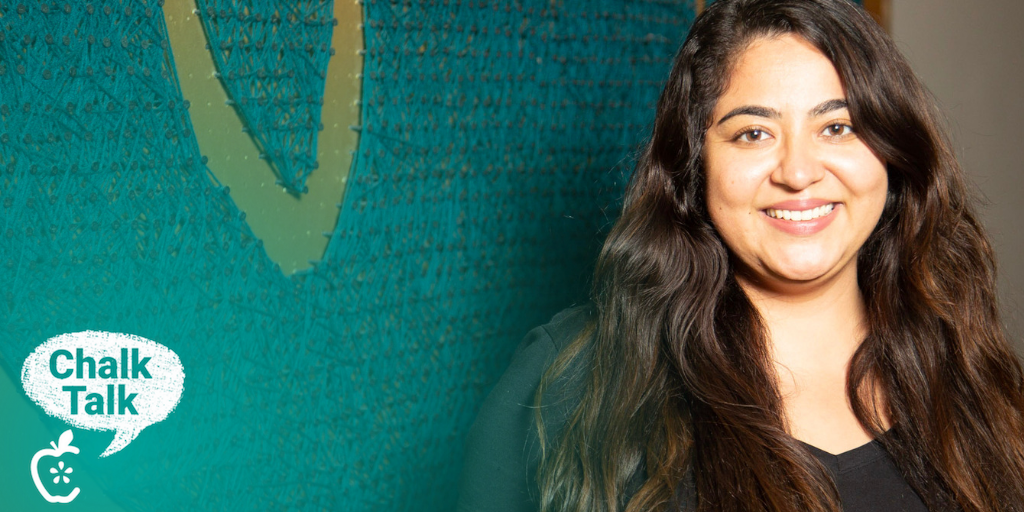August 1, 2019
Chalk Talk: Aisha Pervaiz

During her fifth year teaching middle school in Chicago’s North Lawndale neighborhood, Aisha Pervaiz’s mind started going blank. It happened while she was standing at the front of her classroom, during faculty meetings, and even in parent conferences. What Aisha didn’t realize at the time was that she was just flat-out drained.
She had given everything she possibly could to her school and her students for five years straight. There was simply nothing left in her to give and depression, an illness Aisha had contended with since her teens, took over. Exhausted and dejected, she took a week straight off, which only made her feel worse.
“I lost myself and felt like I couldn’t teach my resilient, brilliant students,” Aisha recalls. “It’s like you’re on an airplane and they tell you to put your oxygen mask on first before helping others. I wasn’t doing that. I ran out of oxygen.”
“It’s like you’re on an airplane and they tell you to put your oxygen mask on first before helping others. I wasn’t doing that. I ran out of oxygen.” -Aisha Pervaiz, #E4ECHI member on #selfcare and #mentalhealth
Aisha thought that by taking time off, she feared that her students–many of whom she knew already had too many unreliable adults in their lives–would hear the message that they didn’t matter. Thinking about how letting her students down meant she felt like she had even less oxygen.
What Aisha knows now, and what everyone should know, is that it shouldn’t have to be this way. We do not have to live or work like this.
“How can we support our students emotionally, if we aren’t taking care of ourselves? Teaching and our mental health are symbiotically related.”
Aisha’s passion for teaching and her students led her to log 60-70 hours a week at the start of her career. Over time, her closest personal relationships slipped away before she even realized she was prioritizing teaching over her own self-care and mental health. It’s a mistake far too many educators make.
“My teacher prep program did a wonderful job educating me on how to effectively teach students from low-income neighborhoods. But the program did not prepare me for how to take care of myself, mentally and physically, so I could be the best teacher possible for my students.”
Aisha thinks that teacher preparation programs should equip teachers with essential strategies to practice self-care in what we all know is an emotionally-taxing profession. Yet, she’s also found support by connecting with her peers through E4E.
In Chicago, E4E members organized a World Mental Health Awareness Day event, where educators gathered to discuss how they can prioritize their mental health. Aisha listened as her peers shared powerful stories about their journeys and participated in sessions on empathetic listening and mindful meditation. She bonded with her colleagues over common experiences like bringing home students’ trauma — and realized she’s not alone.
That sense of belonging doesn’t just stop at teachers–students long to be heard too. As Aisha climbed out of her worst depression, she realized she could help her students by sharing her experiences and normalizing the topic.
“I’ve been open about my experiences, which has led to very raw, honest, and beautiful conversations with my kids,” said Aisha. “And it’s making a difference by creating a safe space for my students where they can share their own struggles, experiences, and insights. My willingness to be vulnerable has been empowering for all of us.”
Coming full circle, now that she’s able to take care of herself, she is better able to meet her students’ emotional needs.
While there is not a one-size-fits-all approach for addressing mental health and self-care, schools can and should be intentional in creating cultures that enable teachers to build a community where they can take a step back and discuss mental health without any stigma. That goes for students, too, as Aisha’s seen the positive outcomes by talking about mental health in her own classroom.
“Ultimately, the better we are for ourselves, the better we can be for our students.” -Aisha Pervaiz #E4ECHI member #selfcare #mentalhealth
As for new teachers, the best advice Aisha can give is: find a community. Point blank. “Find people you can relate to. People who inject you with oxygen, not drain it from you. Seek advice, share, and listen. My community helped me reflect and realize how therapy could benefit me and much, much more. Because ultimately, the better we are for ourselves, the better we can be for our students.”
Aisha found a community through E4E. Learn more about joining E4E!
Spread the Word
Share this article with your friends and colleagues on Facebook and Twitter!
Currently Reading
Chalk Talk: Aisha Pervaiz